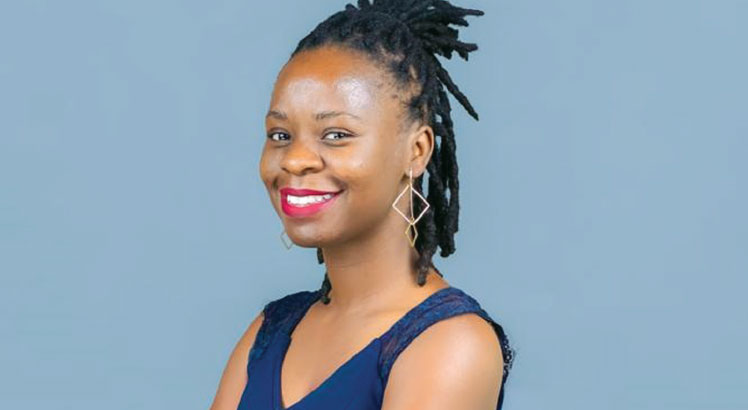Agnes luhanga: empowering female farmers
When she graduated from Mzuzu University in 2010, Agnes Luhanga jumped from one temporary research assistant job to another, in various non-governmental organisations.
It was during her research travels that the young woman from Nthumbatumba Village, Traditional Authority (T/A) Chikulamayembe in Rumphi, noticed that most organisations offering farmer support services in the country are concentrated in the Southern and Central regions, with just a few in the North.
This motivated her to replicate the models of those organisations in her home village. Her idea materialised after attending an Agribusiness Incubation Training and Conference in Senegal that was organised by the African Agribusiness Incubation Network (AAIN), and was sponsored by GIZ and the New Partnership for Africa’s Development (Nepad).

“The conference and training aimed at mobilising African youth to use agriculture as an engine for job and wealth creation. I wrote the concept of Nyalu Agribusiness Hub (NAHub) in 2018 and got it registered in 2020. I decided to focus on supporting women farmers in my community of Chikwawa Village, in Rumphi,” she explains.
NAHub in northern Malawi, therefore, supports women with agricultural advisory services, trainings, and offers a market outlet for their farm produce.
“The women farmers are out-growers for the Hub and are currently into soybeans and honey production,” she explains.
With the objective of bridging the gap between production and marketing, the 36 women farmers under the Hub are not only producing for subsistence purposes but also for commercial purposes.
NAHub delivers agricultural advisory services to ensure good produce and value addition training to maximise gain from produce. They also organise skills trainings for the farmers to establish multiple income streams.
“So far we have trained farmers in beekeeping, fruit juice and jam making, and within the next three years we anticipate to register significant socioeconomic impacts,” says Luhanga, confidently hoping that in future, NAHub will facilitate large-scale production of agri-products to explore and compete in export markets.
Currently working with three women clubs, Luhanga explains that some male community members have approached her, expressing interest to enroll after appreciating the programme being offered by the Hub.
“I am considering adding programs that cater to a wide range of farmers including youth and men. It is a hub after all, and the plan is to reach at least 1 000 farmers by the end of the fifth year,” she says.
However, while they look forward to growth that, among others, encompasses entering export markets, lack of materials to expand their activities is one of the bottlenecks that NAHub is facing.
Apart from that, she cites that: “The value addition aspect in NAHub is still under-exploited because currently the hub does not make enough funds to purchase good equipment for expanding the value addition operations and producing competitive products for commercial markets.
“Also, the hub’s centre at Chikwawa is not connected to the electricity grid; and until that is done, storage of perishable products will continue to be a challenge.”
Born on July 13, 1989 at Kamuzu Central Hospital in Lilongwe, the third born in a family of five children, pursued her secondary school education at Mary Mount Girls in Mzuzu before proceeding to Tukombo Girls Secondary School where she obtained her Malawi School Certificate of Education (MSCE).
She then enrolled into Mzuzu University in 2005 from where she graduated in 2010 with a Bachelor of Science degree in Forestry, upper second class.
Following her studies, the highly sociable young woman who loves travelling, meeting new people, making meaningful connections and learning new cultures, got several part time jobs as a research assistant before getting employed with the National Small Holder Farmers Association of Malawi (Nasfam) in 2012.
“I left Nasfam in 2014 after I acquired a TRECCAfrica scholarship to further my education at the University of Nigeria, Nsukka (UNN) from where I graduated in 2017 with a Master of Science (Agricultural Extension Administration) degree with distinction.
“After graduating, I worked for Mzuzu University as an adjunct lecturer in Social Forestry and Extension Services in water resources management and development,” Luhanga explains.
The agripreneur also recently graduated from the Academy for Women Entrepreneurs (AWE) Malawi programme where she was among the three women who emerged as regional winners of the $2 000 (about K1.6 million) seed money in a pitch competition, which she says gave the hub a big push.
The other winners were Razia Ackim, the founder of beauty by Raz, a makeup studio specialised in special effects makeup for television/film and theater; and Taona Chaola, the founder of Mr Burns Chilli Sauce who also won $2 000 each.
Luhanga cites that the AWE Malawi programme, which is sponsored by the United States Embassy and facilitated by mHub, helped her in restructuring her business model.
“I was having challenges creating a win-win situation between the farmers I support and myself as a businessperson. This is because the model I adopted in my community was from donor-funded organisations; and being a sole proprietor, I was struggling to break even because most of my services were offered for free to members, from my personal resources. I had to restructure my business model to be sustainable in the long run,” she explains.
Concluding, the agriculture enthusiast points out that running a business is not easy, saying that it demands discipline, constant motivation and perseverance.
“Not all days are rosy. There are lots of closed doors that one encounters but the most important thing is to keep on going. This might sound cliché, but it is very profound to me, Rome was not built in a day,” she says.




One Comment